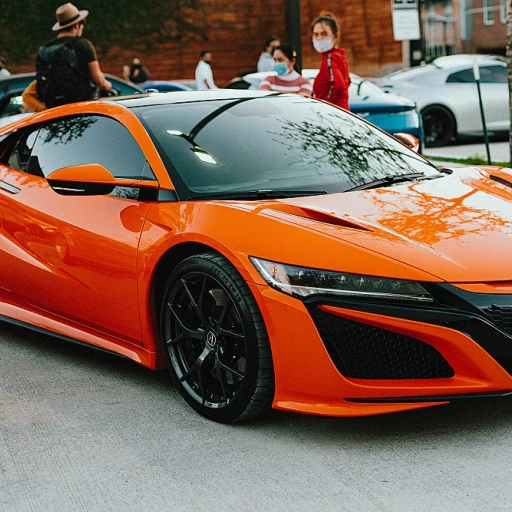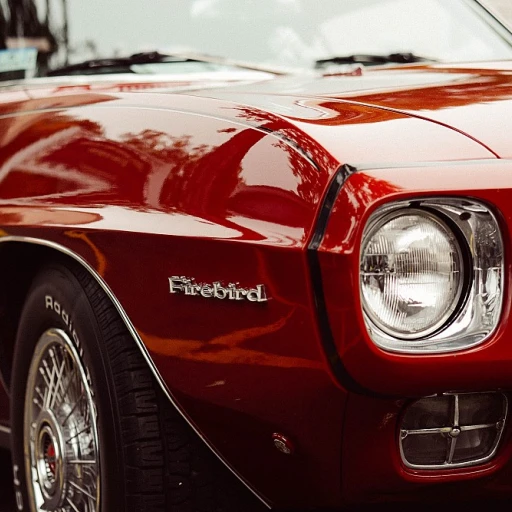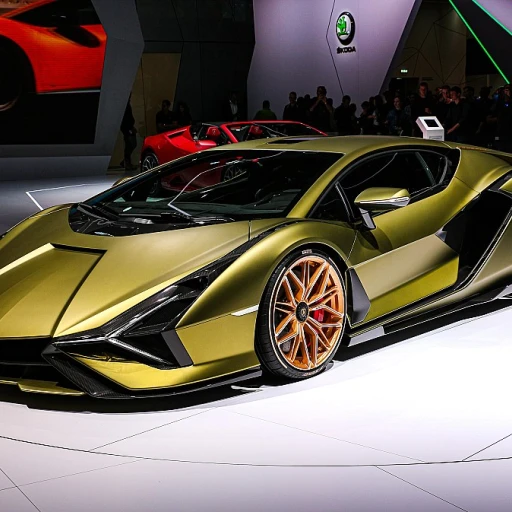
Performance meets efficiency: the power of hybrid sports cars
Hybrid sports cars redefine performance
When the roar of a conventional engine meets the silent zipping power of an electric motor, hybrid sports cars come into their own. Far from the world of solely gasoline-driven beasts, these modern marvels embody a seamless blend of high performance and eco-efficiency.
For instance, the Ferrari SF90 Stradale delivers jaw-dropping numbers of 986 horsepower, thanks to its combination of a turbocharged V8 engine and three electric motors. This translates to a staggering acceleration from 0 to 60 mph in a mere 2.5 secs. These figures aren't just hype but verified specs from Motor Trend.
A shift towards electric power
In the realm of hybrid cars, electric motors play a pivotal role. They offer instant torque and contribute to the overall performance of the vehicle. Models like the Porsche 918 Spyder have set the bar sky-high in this respect. This supercar doesn't just rely on a V8 engine but includes electric motors that add substantial power, aiding in achieving a top speed of 211 mph, as documented by Car and Driver.
Even more mainstream models, such as the Toyota Prius Prime, display how electric power can create a balanced and efficient driving experience that's still engaging. From the smooth transition between gas and electric to the extended electric range, these cars aren't just about saving fuel; they're providing a genuinely thrilling experience at a more accessible price.
Why hybrid sports cars are the future
The growing trend towards balancing performance with environmental responsibility is what makes hybrid sports cars such an exciting proposition. Fuel economy is no longer just a number on a spec sheet but a genuine performance metric. Vehicles like the BMW i8 prove that cutting-edge design doesn't mean sacrificing performance for efficiency. Boasting a fuel economy of 76 MPGe (miles per gallon of gasoline-equivalent) according to the EPA, the i8 illustrates the strides made towards sustainable yet exhilarating driving experiences.
If you're intrigued by this melding of performance and efficiency, you can delve deeper into the emerging top trends in hybrid sports cars. Hybrid technology isn't just a stopgap; it's the vanguard of automotive innovation. From enhanced fuel economies to the inclusion of cutting-edge electric motor technology, hybrid sports cars are set to dominate future automotive narratives.
The role of electric motors in hybrid sports cars
Electric motors redefined performance
Electric motors have become vital in the hybrid sports car arena, with their integration redefining how performance is measured. In traditional sports cars, the internal combustion engine (ICE) was the star player. Now, electric motors share the spotlight. Manufacturers like Toyota and BMW have embraced this technology, developing cutting-edge hybrid models that emphasize speed alongside efficiency.
Take, for example, the BMW i8. Combining a turbocharged 1.5-liter three-cylinder engine with an electric motor, this hybrid sports car delivers a combined output of 369 hp. This setup allows the i8 to accelerate from 0 to 60 mph in just 4.2 seconds, a milestone for BMW's hybrid range (BMW Official).
The magic of instant torque
One of the standout features of electric motors is their ability to provide instant torque. Unlike conventional engines that need to build up revolutions per minute (RPM) to deliver peak power, electric motors can deliver maximum torque from a standstill. This characteristic is particularly beneficial in sports cars where rapid acceleration from a dead stop is crucial. In the Ferrari SF90 Stradale, the electric motors contribute significantly to its blistering 2.5-second 0-60 mph time, making it one of the quickest sports cars ever produced (Ferrari Official).
Boosting fuel efficiency and lowering emissions
Another critical role of electric motors in hybrid sports cars is enhancing fuel efficiency and reducing emissions. Hybrid technology integrates electric-driven powertrains with traditional ICEs, leading to improved fuel economy without sacrificing performance. According to a EPA report, hybrid sports cars generally see a 20-30% improvement in fuel economy compared to their pure ICE counterparts.
In conjunction with these fuel savings, hybrid sports cars also contribute to significant emission reductions. Vehicles like the Porsche Cayenne Hybrid demonstrate this balance excellently. This SUV offers both exhilarating performance and environmentally friendly driving, boasting an EPA-rated 46 MPGe (miles per gallon equivalent) when using its electric mode.
Robust power delivery
The inclusion of electric motors has also enhanced power delivery systems in hybrid sports cars. The ability to seamlessly switch between electric and gas power—or use both simultaneously—results in remarkably smooth and robust power delivery. A perfect case study is the hybrid system in McLaren P1. Its twin-turbo V8 engine and electric motor work in unison to produce an outstanding 903 hp, with the electric motor filling in power gaps and providing rapid acceleration.
Market leaders: Top hybrid sports cars from major brands
Leading hybrid sports cars from top brands
When it comes to hybrid sports cars, some manufacturers have emerged as significant players, pushing the boundaries of performance and innovation. Let’s delve into the standout models from brands like BMW, Porsche, Toyota, and more.
BMW i8
The BMW i8 has been a game-changer in the hybrid sports car sector. Featuring a hybrid electric powertrain that combines a 1.5-liter three-cylinder gas engine with an electric motor, this vehicle offers outstanding performance while maintaining good fuel economy. The i8 delivers up to 369 horsepower (hp) and can accelerate from 0 to 60 mph in just 4.2 seconds. With an electric-only range of 18 miles, it's designed to cater to both performance enthusiasts and environmentally conscious drivers.
Porsche Panamera E-Hybrid
Porsche has also made noteworthy strides with their hybrid offerings. The Porsche Panamera E-Hybrid showcases the brand's commitment to blending high performance with electrification. The Panamera 4 E-Hybrid variant, for example, offers a combined system output of 457 hp and can hit 60 mph in only 4.2 seconds. It offers an electric range of approximately 31 miles, demonstrating Porsche's ability to merge eco-friendliness with exhilarating speed and power.
Lexus LC 500h
Lexus brings luxury and hybrid technology together in the LC 500h. Powered by a 3.5-liter V6 engine paired with an electric motor, this car delivers a combined output of 354 hp. Lexus' unique multi-stage hybrid system ensures seamless power delivery and impressive fuel efficiency, making it a favorite among those who desire luxury without compromising on performance.
Ferrari SF90 Stradale
The Ferrari SF90 Stradale is a hybrid supercar that stands out not only for its performance but also for its innovation. With a total power output of 986 hp, it is Ferrari’s first plug-in hybrid electric vehicle (PHEV). The SF90 can achieve a top speed of 211 mph and offers an electric-only range of up to 15.5 miles. This car is a testament to Ferrari’s philosophy of marrying cutting-edge technology with legendary performance.
Koenigsegg Regera
Lastly, the Koenigsegg Regera is a titan in the hybrid sports car arena. Using a twin-turbo V8 engine in combination with three electric motors, it boasts a whopping 1500 hp. The Regera's innovative direct drive system replaces the traditional gearbox, leading to a smoother and more direct driving experience. This vehicle can reach 62 mph in just 2.8 seconds and has an electric-only range of up to 22 miles.
The early years have seen a rapid evolution, and today’s hybrid sports cars are nothing short of engineering marvels. Brands like BMW, Porsche, Lexus, Ferrari, and Koenigsegg are at the forefront, continuously pushing the envelope to produce vehicles that offer sustainable solutions without sacrificing the thrill and joy of driving.
Fuel economy and environmental impact of hybrid sports cars
Hybrid sports cars balancing performance with fuel economy
The hybrid sports car is proving that you no longer have to choose between performance and fuel efficiency. Technological advancements have allowed these vehicles to achieve top-tier performance while also being kinder to the environment.
In 2019, the EPA stated that plug-in hybrid electric vehicles (PHEVs) can achieve over 100 MPGe (miles per gallon equivalent), showcasing the significant fuel savings offered by such cars (source).
Take the Toyota Prius Prime as an example. According to Toyota, the Prius Prime can be driven up to 25 miles using only electric power, and it has a combined fuel efficiency rating of 133 MPGe. This efficiency doesn’t come at the expense of performance, either. The electric motor complements the internal combustion engine, resulting in a smooth, responsive drive.
Impact of electric range on driving habits
Electric range is crucial for hybrid sports cars because it influences how often drivers need to refuel or recharge. Automakers are consistently increasing the electric-only range of their vehicles, making them more practical for everyday use. For example, the Porsche Cayenne Hybrid has an electric range of up to 27 miles according to Porsche USA (source). This capability allows for short commutes on electric power alone, reducing fuel consumption and emissions.
Drivers find that the increased electric range changes their driving habits significantly. A study by the International Council on Clean Transportation (ICCT) shows that hybrid owners prefer using electric power for urban driving due to cost savings and environmental benefits (source).
Case study: comparing fuel economy of hybrid sports models
Comparing the fuel economy of various hybrid sports cars reveals interesting insights. The BMW i8 offers a combined 69 MPGe and can go from 0 to 60 mph in just 4.2 seconds, demonstrating that fuel efficiency does not hinder high performance (source).
On the other hand, the Lexus LC 500h utilizes hybrid technology to achieve a combined fuel economy rating of 30 MPG while still delivering 354 horsepower (source). While it’s not as fuel-efficient as the Prius Prime, it offers a balance between luxury, performance, and efficiency that appeals to consumers looking for a high-performance hybrid vehicle.
Environmental benefits aligned with performance
The environmental impact of hybrid sports cars goes beyond fuel savings. Studies show that the reduction in emissions from hybrid vehicles contributes significantly to efforts against climate change. For instance, a hybrid vehicle can produce up to 50% less CO2 than a comparable petrol vehicle according to EIA data (source).
Consumers care about the environment but don’t want to compromise on the fun of driving a sports car. The balance that hybrid sports cars offer between high performance and lower emissions is a critical selling point.
For more insights into the features that define hybrid sports cars, continue reading about innovative technologies in hybrid sports cars in the next sections.
Innovative features and technologies in hybrid sports cars
Pioneering hybrid technology
Hybrid sports cars are truly at the forefront of automotive innovation, blending cutting-edge technology with astonishing performance. Take, for example, the Toyota Prius Prime and the Porsche Cayenne Hybrid: these models are striking examples of how advanced features and technologies are reshaping our expectations.
The Toyota Prius Prime, a standout among hybrid cars, is celebrated for its remarkable fuel economy, boasting an EPA-estimated 25 miles on pure electric power alone, followed by hybrid mode delivering up to 133 MPGe. This vehicle includes advanced tech like a plug-in hybrid system with a 1.8-liter 4-cylinder engine paired with an electric motor, ensuring a combined output of 121 horsepower. This system allows drivers to seamlessly switch between electric and hybrid modes, optimizing efficiency and reducing emissions.
Highlighted by industry expert Eric Ibara from Kelley Blue Book, Prius Prime’s distinguishing feature is its advanced regenerative braking system, which recaptures kinetic energy usually lost during braking and uses it to recharge the battery. “This kind of efficiency innovation is precisely what sets hybrid sports cars apart in the modern market,” Ibara notes.
Luxury and performance in the porsche cayenne hybrid
The Porsche Cayenne Hybrid stands as a testament to how hybrid technology can enhance the driving experience without sacrificing power. Its plug-in hybrid electric system combines a 3.0-liter V6 engine with an electric motor, delivering a combined 455 hp and allowing for a 0 to 60 mph acceleration in just 4.7 seconds. This hybrid luxury SUV can achieve up to 27 miles of electric range, which is substantial given its performance capabilities.
Nico Gutmann, an automotive expert with Auto Express, stated, “The Porsche Cayenne Hybrid epitomizes the balance between a high-performance vehicle and eco-conscious driving, achieving both speed and sustainability.” The advanced tech pack includes a slick infotainment system, adaptive air suspension, and Porsche’s signature dynamic driving systems that enhance both comfort and agility.
Impact on fuel consumption and emissions
One major advantage of hybrid sports cars is their impressive fuel economy and reduced emissions. With models like the Prius Prime and Cayenne Hybrid leading the pack, these vehicles offer a clear path toward a greener footprint without compromising on performance. According to a report by the International Energy Agency (IEA), hybrid vehicles can help lower carbon dioxide emissions significantly – often by more than 30% compared to conventional internal combustion engine cars, effectively reducing the overall environmental impact.
Embracing the future”
Hybrid sports cars are setting new benchmarks in the automotive industry. Their innovative features and technologies not only boost performance but also address fuel efficiency and environmental concerns, making them a popular choice among consumers. As markets continue to evolve, hybrid and electric sports cars will likely become a mainstream preference among driving enthusiasts.
Case studies: The Toyota Prius Prime and Porsche Cayenne Hybrid
Real-world performance: up close with the Toyota Prius Prime
The Toyota Prius Prime is often recognized for its exceptional fuel efficiency and eco-friendly attributes, but how does it stack up as a part of the hybrid sports car club? Johns Hopkins University conducted a study revealing the Prius Prime boasts an electric range of approximately 25 miles. While not exactly a sports powerhouse, its combination of a 1.8-liter internal combustion engine and electric motor achieves a combined 121 horsepower, making it a favorite among environmentally conscious drivers.
A study by the Environmental Protection Agency (EPA) noted the Prius Prime's fuel economy, with its combined rating standing at 54 miles per gallon, and it excels in urban settings where low emissions and high efficiency are valued. Despite not matching the traditional notion of a sports car in terms of raw speed, with a top speed of 110 mph and a 0-60mph time of 10.5 seconds, it plays a crucial role in balancing performance with sustainability, especially for city driving.
A closer look at the Porsche Cayenne Hybrid
The Porsche Cayenne Hybrid brings a different energy to the table. Known for power and luxury, Porsche infuses this model with a robust 3.0-liter V6 engine paired with an electric motor that's no slouch. Combined, they deliver a total of 455 horsepower and 516 pound-feet of torque. This makes for exhilarating performance, achieving a 0-60 mph time in just 4.2 seconds!
According to MotorTrend, the Cayenne Hybrid's electric range is about 14 miles, making it less efficient than the Prius Prime in electric mode but far more thrilling in a straight line. It manages a top speed of 157 mph, a figure that places it well within the high-performance range expected of sports hybrids. The Cayenne Hybrid also showcases cutting-edge technology, such as adaptive air suspension and advanced regenerative braking systems, enhancing both performance and driving comfort.
The balancing act of performance and sustainability
These case studies illustrate the spectrum of hybrid sports cars available on the market. The Toyota Prius Prime might prioritize environmental impact and fuel economy, whereas the Porsche Cayenne Hybrid focuses on high performance and luxury. Each vehicle offers a unique flavor of what hybrid technology can bring to sports cars, balancing between power, efficiency, and innovative features.
Consumer perceptions and market trends in hybrid sports cars
Consumer preferences driving the hybrid sports car market
Hybrid sports cars are enjoying a surge in popularity, driven by a shift in consumer preferences toward a balance of performance and sustainability. According to a study by World Economic Forum, 58% of car buyers now consider environmental impact when purchasing a vehicle. This shift is evident in the increasing sales of models like the BMW i8 and Porsche 918 Spyder, which combine speed with eco-friendly technologies.
The rise of hybrid and electric motors
Electric motors have become more than just supplementary power sources in modern hybrid sports cars; they are crucial for achieving impressive acceleration and fuel efficiency. An example is the BMW i8, featuring an electric motor that delivers 143 hp, complementing its 1.5-liter internal combustion engine. This synergy enables the i8 to achieve 0-60 mph in just 4.2 seconds.
Insights from automotive experts
Industry experts such as Karl Brauer, Executive Analyst at iSeeCars, suggest that the appeal of hybrid sports cars lies in their ability to offer the best of both worlds: exhilarating performance and responsible fuel use. “Consumers are increasingly seeking vehicles that align with their eco-friendly values without compromising on power and speed,” Brauer notes.
Market trends and future predictions
Reports from Markets and Markets predict that the hybrid sports car market will grow at a compound annual growth rate (CAGR) of 10.6% from 2021 to 2026. Brands like Toyota, BMW, and Lexus are anticipated to continue leading the charge with innovative models that set new benchmarks in performance and efficiency.
The enduring legacy of hybrid technology
As automotive technology advances, the lines between hybrid and all-electric vehicles are starting to blur. Hybrid sports cars are set to benefit from continual developments in battery technology, which will further enhance their performance and electric range. This evolving landscape suggests that hybrid sports cars will remain a crucial segment as we transition into an era dominated by electric vehicles.
Future of hybrid sports cars: trends to watch
Wash of future technologies
Hybrid sports cars are being redefined through innovation and changing consumer demands. The trend of merging sustainability with high performance is gripping the automotive industry.
BMW's vision for hybrid sports cars is headlined by the sleek i8, combining a 1.5-liter engine and electric motor for an impressive 369 horsepower. Mercedes-Benz isn't left behind either, with the AMG GT 63 S E Performance, pushing the boundaries with 831 horsepower and an electric-only range of 7 miles (Source: Car and Driver).
Evolution of EVs in sports car segment
Automakers are constantly enhancing the power of electric motors to boost acceleration. For instance, Ferrari's SF90 Stradale, equipped with three electric motors, achieves a 0-60 mph time of 2.5 seconds (Source: Road and Track).
The Toyota Prius Prime and Porsche Cayenne Hybrid showcase how hybrid technology can improve fuel economy without sacrificing performance. The Prius Prime achieves an astounding 133 MPGe with an electric range of 25 miles, while the Cayenne Hybrid combines luxury and a combined 46 MPGe rating (Source: Fuel Economy).
Plug hybrid electric vehicles on the rise
Plug hybrid electric hybrids are becoming popular, mixing the benefits of electric range with traditional engine power. Auto experts recognize the efficiency and versatility of models like the Range Rover Sport PHEV and the McLaren Artura, the latter showcasing the ability to leverage electric power for driving dynamics (Source: Top Gear).
Volvo's commitment to plug hybrid technology shines with the XC60 Recharge, boasting a 19-mile electric range and cutting-edge safety features, proving that sustainability and luxury aren't mutually exclusive (Source: Volvo Cars).
Tailored features for the next-gen driving
Car manufacturers are equipping hybrid sports cars with state-of-the-art features to cater to the desires of modern drivers. Honda's NSX leverages a twin-turbo V6 engine and three electric motors, optimizing torque and traction. Luxury brands like Lexus with its LC 500h offer plush interiors while introducing hybrid efficiency (Source: Automobile Magazine).
What consumers seek in future hybrids
Consumers increasingly expect hybrids that exhibit strong performance, excellent fuel economy, and advanced features. A market study by J.D. Power suggests that 47% of new car buyers consider fuel efficiency a critical factor (Source: J.D. Power).
Major trends indicate a shift towards more plug hybrid suvs and hybrid sports cars, projected to capture a significant share of the market by the end of the decade. As automakers innovate and improve the electric range and top speed of hybrid vehicles, the future promises an exhilarating yet sustainable driving experience.













